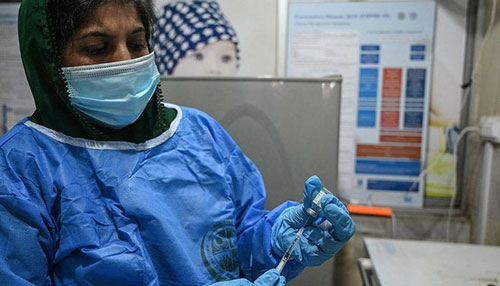New York
The total number of coronavirus vaccine jabs administered globally passed the one billion mark on Saturday despite a surge in infections in many countries across the world, including India.
At least 1,002,938,540 vaccine doses have been administered in 207 countries and territories, according to an AFP tally.
Nevertheless, the number of new infections topped 893,000 worldwide on Friday, a new daily record.
India accounted for more than a third of these, with authorities there announcing 346,786 new cases on Saturday, a record for a single country since the start of the pandemic.
Thailand, which had long avoided the worst of the virus, was also grappling with a spiralling caseload.
Prime Minister Prayut Chan-O-Cha said Saturday that more than 1,400 Covid-19 patients were waiting to be admitted to hospital.
The pandemic has now killed more than three million people worldwide since the outbreak emerged in China in December 2019.
Hard-hit Brazil has seen its deadliest month yet of the virus with nearly 68,000 reported fatalities in April, even though there is still a week to go.
India reported 2,624 deaths, a daily record, on Saturday as a surge of cases has pushed the government to organise special trains to get oxygen supplies to worst-hit cities.
One “oxygen express” carrying 30,000 litres of oxygen arrived in northern Lucknow at dawn on Saturday, where armed guards were waiting to escort trucks to hospitals.
The Indian air force is also being used to transport oxygen tankers and other supplies around the country and to bring oxygen equipment from Singapore.
Tragically, oxygen cylinders were implicated in a fire that tore through a virus intensive care unit in the Iraqi capital Baghdad, leaving at least 23 people dead.
Accelerating rollouts With the pandemic still showing no sign of slowing, governments around the world are placing their hopes in vaccines.
And worldwide, the number of vaccine doses administered has doubled in less than a month.
Nevertheless, while the majority of poor countries have also started to vaccinate — mainly thanks to the Covax programme — inoculation is still largely a privilege of high-income countries, home to 16 percent of the world’ population, administering 47 percent of vaccine doses.
By contrast, low-income countries account for just 0.2 percent of shots so far. In the US, regulators have approved the re-start of a rollout of Johnson & Johnson vaccines halted over blood clotting concerns.
In Europe, Belgium said Saturday it would authorise the J&J shot for all adults, having already received 36,000 doses and expecting a total of 1.4 million between April and June.
The European Union as a whole said it would have enough vaccines to immunise 70 percent of its adult population by the end of July.
A 91-year-old British grandmother, Margaret Keenan, who on December 8 became the first person in the Western world to get an approved coronavirus vaccine, urged people to get inoculated.
“It really is the best thing I’ve ever done,” she said. “I’m telling everyone to go and get it… I hope everyone comes forward,” she said.—AFP










